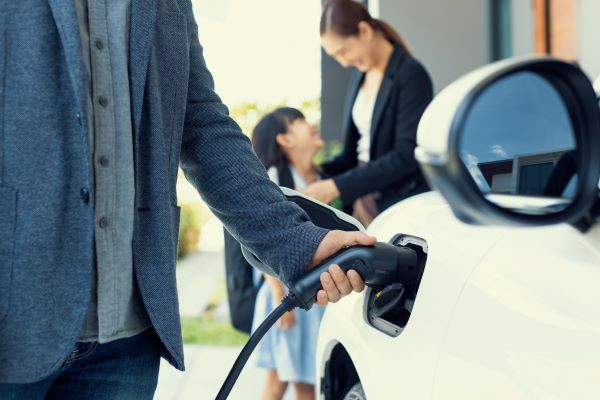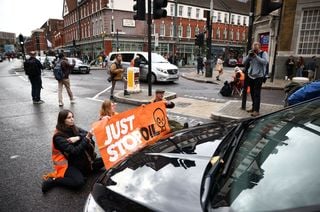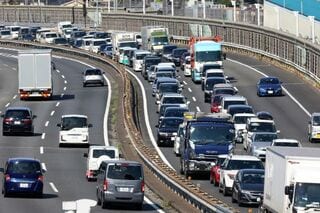排出削減の取り組みを「ステータス化」していくことが必要
一般に、社会的ステータスと所得は強く相関している。高いステータスは高所得につながり、排出量が多くなる傾向がある。
ただし、ステータスの設定を上手に誘導すれば、排出削減につなげることもできる。これは、「他人が環境のことをどれだけ気にかけているか」を、ステータスとして確立することと言える。
例えば、ソーラーパネル付きの家に住んだり、電気自動車に乗ったりすることが、高いステータスの象徴だといった社会認識が広がれば、排出削減の取り組みにつなげることもできる*14。
 電気自動車に乗ることが高いステータスの象徴という社会認識は広まるか
電気自動車に乗ることが高いステータスの象徴という社会認識は広まるか
CO2排出の問題は、人々のライフスタイルにかかっている。これまでのような化石燃料の消費増大を続けるライフスタイルは、気候変動問題から見てサステナブル(持続可能)とは言えないだろう。
ただし、ライフスタイルを見直したから、変えたからといって、すぐに問題が解決するわけではない。見直しの効果がどれだけあるのかもわかりにくい。ライフスタイルを見直すきっかけもつかみにくい。
そこで、他人の目を気にするかどうか、という環境心理学の知見をうまく活用することが考えられる。つまり、「他人が環境のことをどれだけ気にかけているか」を見せる。
そのために、各種の排出削減の取り組みをステータス化していく、といった方法も考えられる。ソーラーパネル付きの家に住んだり、電気自動車に乗ったりすることが“カッコイイ”という感覚を醸成していくわけだ。
しかし、不平等は排出削減にマイナスに寄与する傾向がある。環境を守るためにお金を払ったり、環境保護の政策を受け入れたりすることについて、富裕層と貧困層の取り組み意欲に違いが出る可能性があるためだ*15。不平等が拡大すれば、貧困層を中心に排出削減への取り組み意欲が削がれ、CO2排出抑制が進まなくなる可能性がある。
いずれにせよ、社会全体でCO2排出削減の意識を高め、具体的な行動を進めていくことが必要と言えそうだ。
【出典・参考資料】
*1:"Climate Change 2022-Mitigation of Climate Change" IPCC WG3(2022)
*2:"Comparing energy use by gender, age and income in some European countries" R.Raty A.Carlsson-Kanyama(2010)
*3:"Are younger generations higher carbon emitters than their elders?" L.Chancel (2014)
*4:"Men Shape a Downward Trend in Car Use among Young Adults-Evidence from Six Industrialized Countries" T. Kuhnimhof J. Armoogum R. Buehler J. Dargay J. M. Denstadli T. Yamamoto(2012)
*5:"Age-structure,urbanization,and climate change in developed countries: Revisiting STIRPAT for disaggregated population and consumption-related environmental impacts." B.Liddle S.Lung(2010)
*6:"Future scenarios for energy consumption and carbon emissions due to demographic transitions in Chinese households." B.Yu Y.M.Wei K.Gomi Y.Matsuoka (2018)
*7:Our World in Data(英国オックスフォード大学の研究者らが運営するデータベース)による。
*8:"Household carbon Inequality in the U.S." F.Kuishuang H.Klaus S.Kaihui(2021)
*9:"China’s carbon emissions from urban and rural households during 1992-2007" L.-C.Liu G.Wu J.-N.Wang Y.-M.Wei (2011)
*10:"Who emits most? Associations between socio-economic factors and UK households’home energy, transport, indirect and total CO2 emissions." M.Buchs S.V. Schnepf(2013)
*11:"Working Hours and Carbon Dioxide Emissions in the United States, 2007-2013" J.B.Fitzgerald J.B.Schor A.K.Jorgenson(2018)
*12:"When reduced working time harms the environment: A panel threshold analysis for EU-15, 1970-2010" Q.Shao S.Shen(2017)
*13:"Motivating Society-wide Pro-environmental Change" T.Bouman L.Steg (2019)にある以下の主張。
"We are facing environmental crises, but pro-environmental action is seriously lagging behind. Contrary to popular beliefs, we argue that this is not caused by people undervaluing the environment but rather by people structurally underestimating how much others care."
*14:"Going Green to Be Seen: Status, Reputation, and Conspicuous Conservation" V.Griskevicius J.M.Tybur B.Van den Bergh(2010)
*15:"Income inequality and willingness to pay for environmental public goods." S.Baumgartner M.A.Drupp J.N.Meya J.M.Munz M.F.Quaas(2017)














